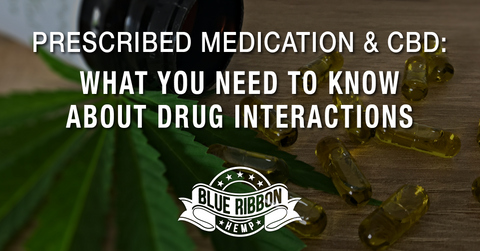Prescribed Medication & CBD: What You Need To Know About Drug Interactions

March 8 2021, Updated 6:54 p.m. ET
CBD is becoming more and more popular for its potential to ease anxiety, chronic pain, insomnia and a variety of other health conditions. Though cannabidiol (CBD), is still new in terms of scientific testing, there is anecdotal evidence and emerging studies that point in the direction of potentially therapeutic benefits. CBD may be able to help you with pain management, sleep cycles and much more; but it could interfere with any prescribed medications? Let’s find out.
How Are Drugs Metabolized?
Whenever you take a supplement or medication, it has to be metabolized by the body, in other words broken down. Our bodies use enzymes to metabolize everything that is taken in, be it food or drink, drugs or supplements. When enzyme activity within the body is influenced, drug interactions can be too.
What Is CBD?
CBD is one of many naturally occurring compounds in hemp and cannabis sativa plants. CBD is extracted from cannabis and hemp plant’s flowers, stems and seeds; which can then be isolated, combined or crafted into a variety of CBD products. CBD works directly with the human body’s endocannabinoids system. By interacting with receptors responsible for regulating many bodily functions - such as appetite, mood, pain, sleep cycles and more - CBD can have a positive effect on serotonin levels in the body, while simultaneously binding with receptors in the ECS. Based on research to date, CBD has been shown to be generally safe and has few to no side effects.
CBD & Bodily Enzymes
CBD interacts most directly with the cytochrome P450 family of enzymes responsible for the clearance of various compounds and hormone synthesis. CBD is thought to be metabolized by cytochrome P450 (CYP450) and CYP3A4, but also functions as a competitive inhibitor, meaning they can block each other. Interestingly enough, some compounds in grapefruit can have the same effect, so you may have heard of advice to not eat grapefruit before taking some medications.
The way CBD works with some enzymes means it does interact with the way some medications or drugs are metabolized by the body. Research is still limited in determining exactly how CBD interacts with the cytochrome P450 enzymes, but it is thought that they can influence in either way, making medications stronger or weaker. One study found no interactions within the metabolic pathway when 40mg of CBD was administered, but a later one found a low dose that blocked the metabolizing of an epilepsy drug.
What To Do?

If you are interested in trying a CBD product, it’s always a good idea to consult your doctor about it first, especially if you are on a prescribed medication already. A health care professional can help you determine a dosage and product that is safe with your medications.
Another option would be to try a CBD topical, like a lotion, balm or salve. CBD topicals are applied directly to the skin and unlike sublingual products, they typically don’t enter the bloodstream unless a transdermal product intended to do so.
Along with consulting your doctor about adding CBD to regimen, finding a reliable and carefully crafted product is also key. Always turn to companies with third party lab test results to ensure quality, potency and purity. There are even companies like Blue Ribbon Hemp, crafted in-part by Dr. Igor Bussel, with the care of senior citizens in mind. Completely THC-free and backed by Real Tested CBD reviews and lab results, Blue Ribbon Hemp could be the right choice for you when it comes to CBD. Click here to learn more about why Blue Ribbon Hemp was created.


